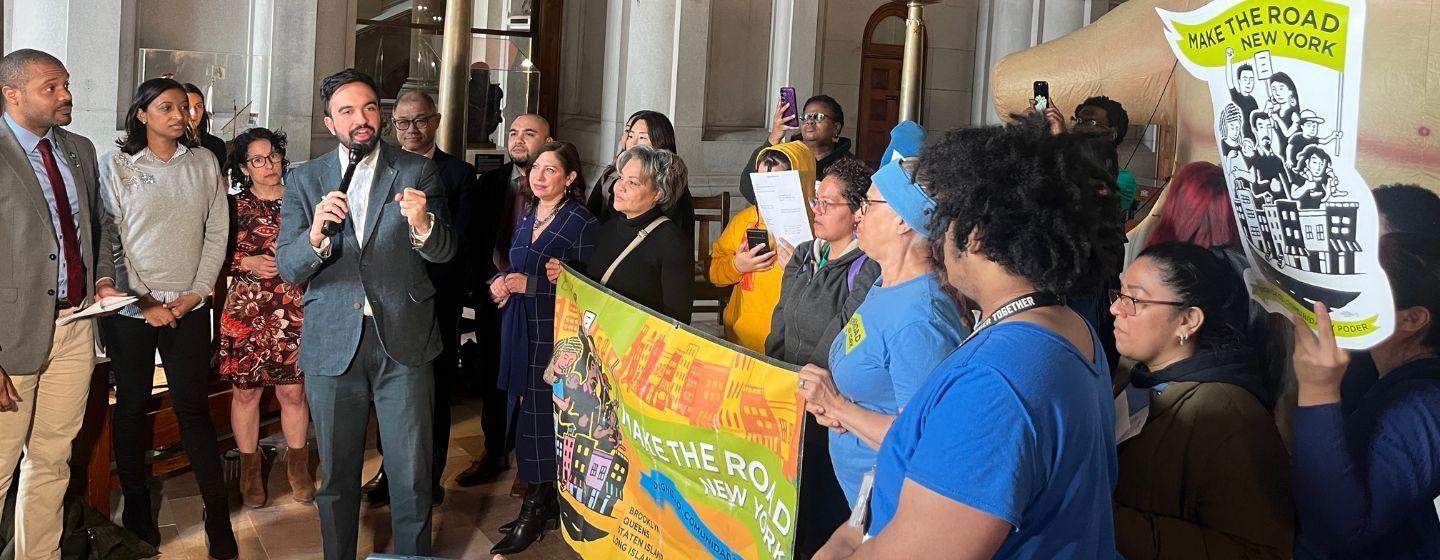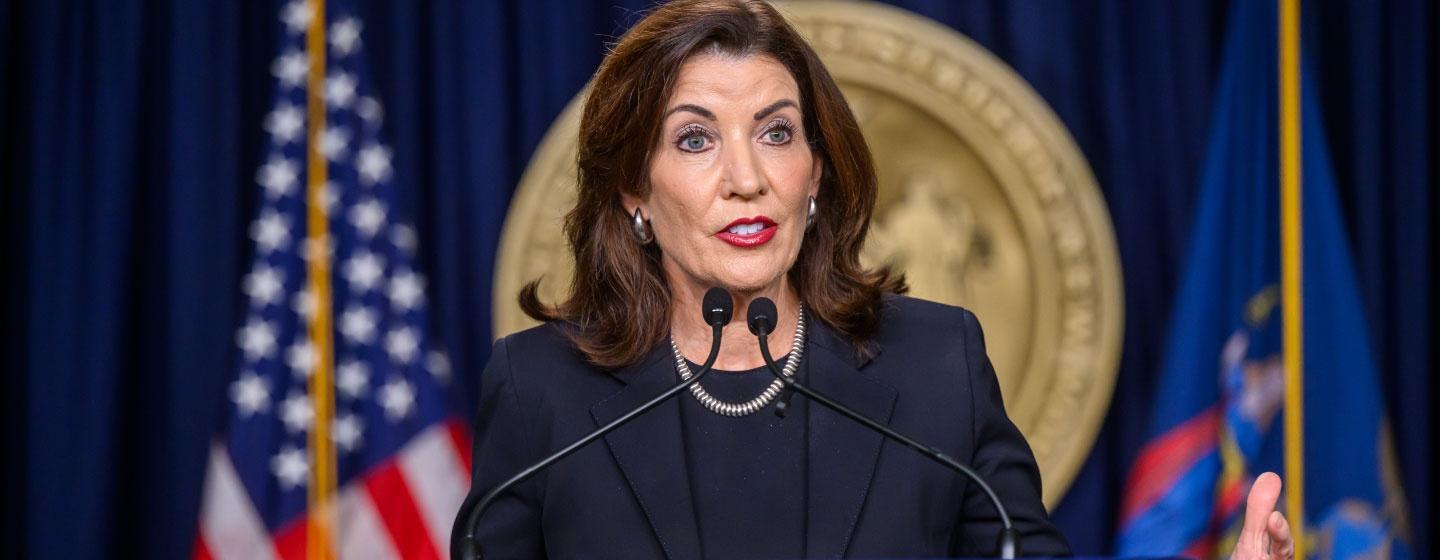An Inside Look at the Fight for Universal Child Care in Albany

For about five years, some state lawmakers have been fighting in Albany to establish universal child care across the state. At a time when the state continues to move through a childcare crisis, some state lawmakers hope to get $1 billion in the final state budget to keep them on a path to achieve their goal.
State Sen. Jabari Brisport, a Democrat representing parts of Brooklyn and the chair of the Senate Children and Families Committee, said part of the Universal Child Care Act is an immediate establishment of a permanent childcare workforce retention fund.
The senator said the goal is to get childcare workers on a similar payment schedule and salary to school teachers.
“If we can get this $500 million fund into the budget that will bring us a step towards eventually the universal concept of treating them like the teachers they are,” Brisport said.
Dede Hill, policy director at the Schuyler Center for Analysis and Advocacy, stressed that lawmakers must continue on a path towards making childcare universal.
“If we have universal child care, it is like kindergarten. It is something you don't have to worry about,” Hill said.
Hill said that currently in New York, child care is one of the top affordability stressors for families, and navigating the state assistance process isn’t easy.
“Right now, the way that New York's child care assistance program is set up, … you have to be eligible. And there are a whole host of requirements that you have to meet. You have to be within the income band that is eligible. You also have to meet work requirements or other activity requirements,” Hill said.
State lawmakers are asking for $1 billion dollars in the final budget–including $500 million for a childcare workforce retention fund and $500 million for child care assistance vouchers.
Lawmakers argue this funding will help keep enough workers in the state’s Child Care Assistance Program and ensure families can access child care assistance at a time when there are more enrolled and or eligible New Yorkers than the program can currently handle.
Part of the measure was included in the Senate’s one-house budget proposal and is being discussed in budget negotiations.
Some state lawmakers leading this fight assert the need is significant–highlighting New York City and other counties' lack of funding and consequential constraints on the Childcare Assistance Program.
“Not only does it mean can they not take new families who are eligible right now, but as families start to recertify, they’re going to be told that there isn’t any more money and they cannot get the money that they’re already counting on so that they can go to work everyday,” said Assembly Member Sarah Clark, a Democrat representing parts of Rochester.
Clark added that this is a significant issue facing New York families, and lawmakers need to address it by ensuring this funding gets into the budget.
“This is huge, we need to fix this in this year’s budget or our commitment to childcare, our desire as a state to lead in the childcare world is going to come crumbling down,” said Clark.
Some advocates added that if lawmakers can’t get this funding measure in the final budget, there will be dire consequences.
“If there is no additional investment in the Child Care Assistance Program, instead of continuing a steady march toward universal child care, we're going to actually take a huge step back, because there are going to be wait lists,” Clark added.
Hill also said there will be thousands of children who will likely be kicked off of child care assistance because of inadequate investment, starting as early as April.
However, some lawmakers said they feel confident this measure can make it into the budget.
“We have leadership on our side so far; we just need to make sure they commit to the funding in the budget,” said Brisport.
While this measure will support the fight for a permanent childcare workforce pay equity fund listed as part of the Universal Childcare Act, some state lawmakers said this funding doesn’t necessarily get them closer to universal childcare.
Assembly Member Andrew Hevesi, a Democrat representing parts of Queens and the chair of the Children and Families Committee, said that this funding measure keeps lawmakers from moving backwards.
“What it does is make sure you don’t lose the gains you’ve already made,” the Assembly member said.
However, the fight continues. Hevesi said this funding helps address an issue preventing them from moving further toward the finish line of universal childcare.
“This issue is important and we need to solve this, sort of triage. But the issue that prevents us from getting to universal childcare is we’re not paying the workforce,” Hevesi added.
Hevesi, a lead sponsor of the bill in the Assembly, added that in the longer term, the fight for universal child care is a matter of political will–highlighting the number of lawmakers from both sides of the aisle who came to speak at a recent press conference about issues facing childcare.
“We have the resources, and you certainly saw the support earlier,” the Assembly member said. “I got bi-partisan support, we got both houses. There are people ready to yell and scream about childcare. It’s a matter of political will.”
Some Republican lawmakers said they support the concept of universal childcare and certainly the $1 billion in the budget to address child care challenges; however, they have different ideas of how to get there.
“I think my Republican colleagues understand that universal childcare is certainly a path towards where we are going; we might have different ideas on how to cover childcare needs. But we want to make sure that we fill gaps that exist,” said Assembly Member Brian Maher, a Republican representing parts of Delaware, Orange, Otsego, and Ulster counties and a member of the Children and Families committee.
Maher added that the conference is open to any idea that will help New York’s children, the workforce, and the local economy.
Sen. Brisport said lawmakers on both sides of the aisle agree there is a need to address childcare, but they have differences on whether or not universal childcare is the answer.
“They may have ideological differences; some of them say they don’t support universal, they want means tested, they only want some people to get the child care. I disagree. I think our best model is the way public schools are set up,” he said.
The final budget is past its deadline, and any day now, Gov. Kathy Hochul could announce a conceptual budget where lawmakers will know if they won this fight for $1 billion for childcare, keeping the fight for universal child care on track.
Related

‘Bell-to-Bell’ Smartphone Ban in NY Schools Is on Track To Become Law
Governor Hochul and teachers unions favor all-day restrictions on smartphones, while administrators want more flexibility.


